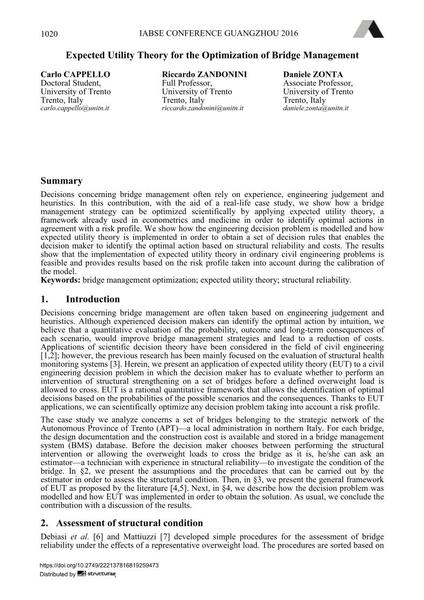Expected Utility Theory for the Optimization of Bridge Management

|
|
|||||||||||
Bibliografische Angaben
| Autor(en): |
Carlo Cappello
Riccardo Zandonini Daniele Zonta |
||||
|---|---|---|---|---|---|
| Medium: | Tagungsbeitrag | ||||
| Sprache(n): | Englisch | ||||
| Tagung: | IABSE Conference: Bridges and Structures Sustainability - Seeking Intelligent Solutions, Guangzhou, China, 8-11 May 2016 | ||||
| Veröffentlicht in: | IABSE Conference, Guangzhou, China, 8 – 11 May 2016 | ||||
|
|||||
| Seite(n): | 1020-1027 | ||||
| Anzahl der Seiten (im PDF): | 8 | ||||
| Jahr: | 2016 | ||||
| DOI: | 10.2749/222137816819259473 | ||||
| Abstrakt: |
Decisions concerning bridge management often rely on experience, engineering judgement and heuristics. In this contribution, with the aid of a real-life case study, we show how a bridge management strategy can be optimized scientifically by applying expected utility theory, a framework already used in econometrics and medicine in order to identify optimal actions in agreement with a risk profile. We show how the engineering decision problem is modelled and how expected utility theory is implemented in order to obtain a set of decision rules that enables the decision maker to identify the optimal action based on structural reliability and costs. The results show that the implementation of expected utility theory in ordinary civil engineering problems is feasible and provides results based on the risk profile taken into account during the calibration of the model. |
||||
| Stichwörter: |
Tragwerkszuverlässigkeit
|
||||
